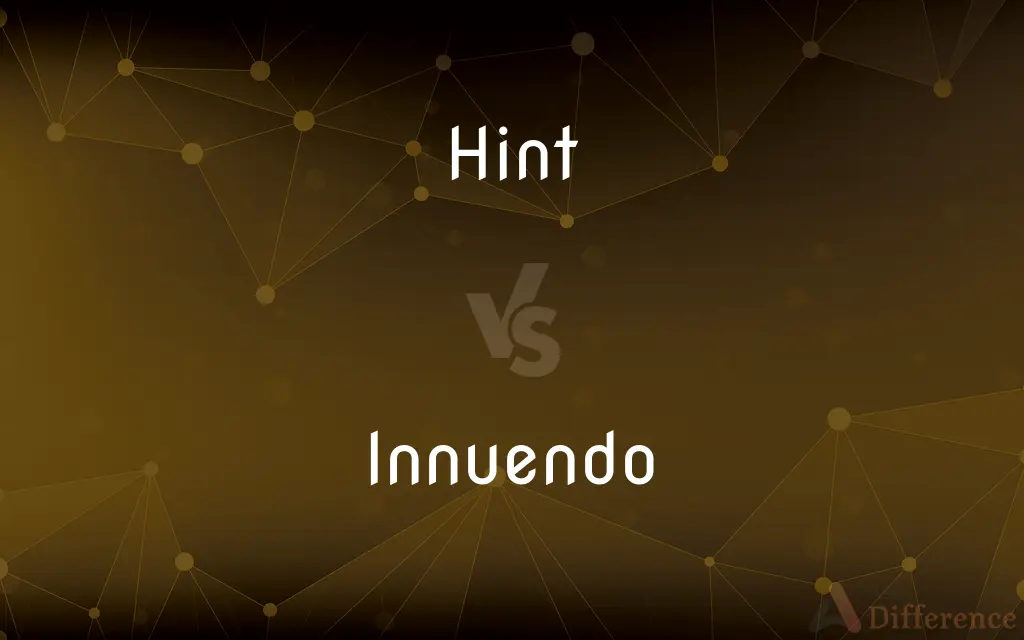Hint vs. Innuendo — What's the Difference?

Difference Between Hint and Innuendo
ADVERTISEMENT
Compare with Definitions
Hint
A slight or indirect indication or suggestion
He has given no hint of his views
Innuendo
An innuendo is a hint, insinuation or intimation about a person or thing, especially of a denigrating or a derogatory nature. It can also be a remark or question, typically disparaging (also called insinuation), that works obliquely by allusion.
Hint
A small piece of practical information or advice
Handy hints on saving energy in your home
Innuendo
An indirect or subtle, usually derogatory implication in expression; an insinuation.
Hint
Suggest or indicate something indirectly or covertly
He hinted that the sale might be delayed
The Minister hinted at a possible change of heart
ADVERTISEMENT
Innuendo
(Law) A plaintiff's allegation explicating the defamatory meaning of the publication or utterance in a libel suit.
Hint
A slight indication or intimation
Wanted to avoid any hint of scandal.
Innuendo
A derogatory hint or reference to a person or thing. An implication, intimation or insinuation.
She made a devious innuendo about her husband, who was embarrassed.
Hint
A brief or indirect suggestion; a tip
Stock-trading hints.
Innuendo
(logic) A rhetorical device with an omitted, but obvious conclusion, made to increase the force of an argument.
Hint
A statement conveying information in an indirect fashion; a clue
Give me a hint about the big news.
Innuendo
(legal) Part of a pleading in cases of libel and slander, pointing out what and who was meant by the libellous matter or description.
Hint
A barely perceptible amount
Just a hint of color.
Innuendo
To interpret (something libellous or slanderous) in terms of what was implied.
Hint
(Archaic) An occasion; an opportunity.
Innuendo
An oblique hint; a remote allusion or reference, usually derogatory to a person or thing not named; an insinuation.
Mercury . . . owns it a marriage by an innuendo.
Pursue your trade of scandal picking;Your innuendoes, when you tell us,That Stella loves to talk with fellows.
Hint
To express or state indirectly
She hinted that she might prefer our company to theirs.
Innuendo
An averment employed in pleading, to point the application of matter otherwise unintelligible; an interpretative parenthesis thrown into quoted matter to explain an obscure word or words; - as, the plaintiff avers that the defendant said that he (innuendo the plaintiff) was a thief.
Hint
To indicate or make evident in an indirect manner
"The diversity of observations hinted that they had no common origin" (Carl Sagan).
Innuendo
An indirect (and usually malicious) implication
Hint
To give a hint
Wouldn't hint at the true purpose of the meeting.
Hint
A clue.
I needed a hint to complete the crossword.
Hint
An implicit suggestion that avoids a direct statement.
He gave me a hint that my breath smelt.
Hint
A small, barely detectable amount.
There was a hint of irony in his voice.
I could taste a hint of lemon in my iced water.
Hint
(computing) Information in a computer-based font that suggests how the outlines of the font's glyphs should be distorted in order to produce, at specific sizes, a visually appealing pixel-based rendering; an instance of hinting.
This font does not scale well to small sizes; the hints for the 10-point letter 'g' still need work.
Hint
(databases) An instruction to the database engine as to how a query should be executed, for example whether to use an index or not.
Hint
(obsolete) An opportunity; occasion; fit time.
Hint
(intransitive) To imply without a direct statement; to provide a clue.
She hinted at the possibility of a recount of the votes.
Hint
(transitive) To bring to mind by a slight mention or remote allusion; to suggest in an indirect manner.
To hint a suspicion
Hint
(transitive) To develop and add hints to a font.
The typographer worked all day on hinting her new font so it would look good on computer screens.
Hint
To bring to mind by a slight mention or remote allusion; to suggest in an indirect manner; as, to hint a suspicion.
Just hint a fault and hesitate dislike.
Hint
To make an indirect reference, suggestion, or allusion; to allude vaguely to something.
We whisper, and hint, and chuckle.
Hint
A remote allusion; slight mention; intimation; insinuation; a suggestion or reminder, without a full declaration or explanation; also, an occasion or motive.
Our hint of woeIs common.
The hint malevolent, the look oblique.
Hint
An indirect suggestion;
Not a breath of scandal ever touched her
Hint
A slight indication
Hint
A slight but appreciable addition;
This dish could use a touch of garlic
Hint
A just detectable amount;
He speaks French with a trace of an accent
Hint
An indication of potential opportunity;
He got a tip on the stock market
A good lead for a job
Hint
Drop a hint; intimate by a hint
Share Your Discovery

Previous Comparison
Bocce vs. Boccia
Next Comparison
Marsh vs. Mire














































